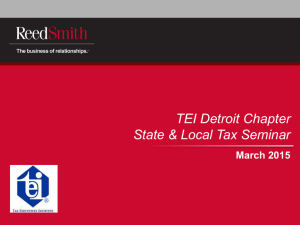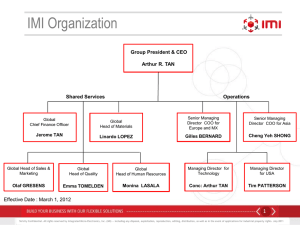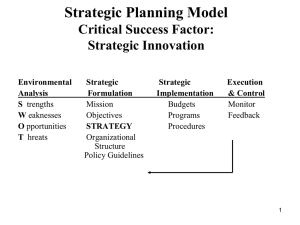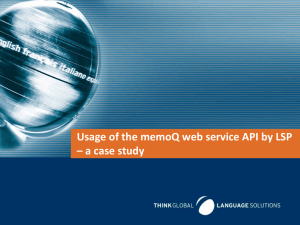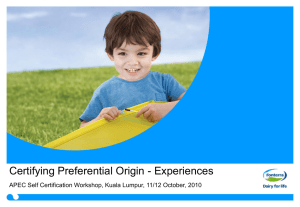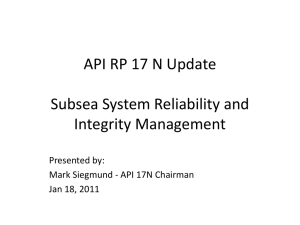PowerPoint Slides
advertisement
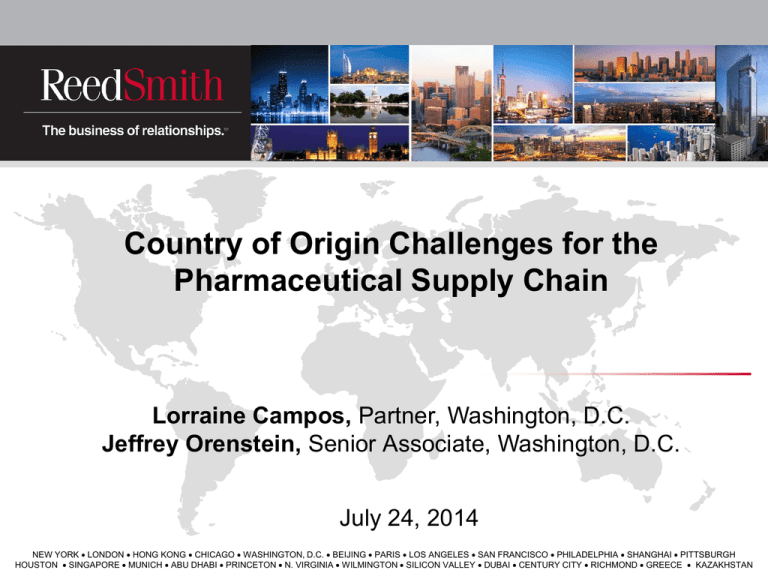
ReedSmith Country of Origin Challenges for the Pharmaceutical Supply Chain Lorraine Campos, Partner, Washington, D.C. Jeffrey Orenstein, Senior Associate, Washington, D.C. July 24, 2014 NEW YORK LONDON HONG KONG CHICAGO WASHINGTON, D.C. BEIJING PARIS LOS ANGELES SAN FRANCISCO PHILADELPHIA SHANGHAI PITTSBURGH HOUSTON SINGAPORE MUNICH ABU DHABI PRINCETON N. VIRGINIA WILMINGTON SILICON VALLEY DUBAI CENTURY CITY RICHMOND GREECE KAZAKHSTAN ReedSmith Presenters Lorraine Campos Partner, Global Regulatory Enforcement Washington, D.C. lcampos@reedsmith.com 202.414.9386 Jeffrey Orenstein Senior Associate, Global Regulatory Enforcement Washington, D.C. jorenstein@reedsmith.com 202.414.9217 2 ReedSmith No One Country Can Make A Pencil • Shaft • US lumber • Eraser • Malaysian rubber, Italian pumice • Lead • Sri Lanka graphite, Mississippi clay • Brass coupling • Chilean copper, US zinc • Yellow Lacquer • Congo 3 ReedSmith What Is Your Product’s “Country of Origin” (COO)? • The answer depends on who is asking because different agencies use different standards: • FDA (place of manufacture on label) • U.S. Customs (COO marking, duty calculation) • Government Procurement (Buy USA preferences) • FTC (consumer protection laws) • Foreign Customs authorities (certificates of origin) • What are the different standards? • Risks of Noncompliance 4 ReedSmith FDA Labeling Requirements • Labeling: FDA requires drug labels to “bear conspicuously the name and place of business of the manufacturer, packer, or distributor” • Don’t confuse “place of business of the manufacturer” with COO • “Place of business” may be New Jersey HQ but COO may be France • Misbranding: Incorrect markings may constitute “misbranding” under FDA regulations 5 ReedSmith U.S. Customs Marking Requirements • Why does Customs ask for the COO? • Marking: COO must appear on product or packaging if not U.S.-made • Duties: COO impacts the customs duties owed • What is their standard? • “Substantial transformation” for marking • Exception: NAFTA imports use special negotiated test 6 ReedSmith Substantial Transformation • An article is a product of a country only if it is either… 1. wholly a product of that country, which is increasingly rare; or 2. “substantially transformed” in that country • Substantial transformation occurs when an article emerges from processing as a new and different article of commerce that possesses a new name, character, or use • National Juice Products Assoc. v. United States • Facts: Imported juice concentrate blended with water, orange essences, orange oil, and U.S. juice concentrates • Held: No substantial transformation because the imported juice concentrate was the "very essence" of the finished product 7 ReedSmith Drugs: Substantial Transformation • Drugs: The COO for most drugs is the COO of the active pharmaceutical ingredient (API) • Customs views imported API much like imported orange juice concentrate—it is the “essence” of the finished product • Unless the API is chemically altered or its properties enhanced, the API is not substantially transformed • Some Exceptions: • Two APIs are combined • Processing of API increases efficacy 8 ReedSmith Customs Ruling HQ H073995 (Oct. 29, 2009) • Issue: Whether the API metoprolol succinate was substantially transformed in Sweden where it was processed to make Toprol-XL. • Manufacturing Process Included: • Creation of metoprolol succinate beads by spraying a solution of metoprolol onto cores • Coating the metoprolol beads with a polymer solution • Beads are mixed with excipients and compressed into tablets • Tablets are coated with an additional polymer solution and polished prior to packaging • This process was more complex and more costly than the process used to produce the API • Decision: CBP held that, despite the complexity of the manufacturing process, the metoprolol succinate did not undergo a substantial transformation. • Reasoning: • CBP noted the complexity of the manufacturing process is not the determining factor. Nor is it sufficient that the process “alter[ed] the delivery rate of the drug or otherwise improv[ed] the delivery mechanism.” • Although the API was “unusable, if not toxic” in its raw or bulk form, CBP noted that any substance can be toxic if ingested improperly and that altering the dosage or delivery rate of a drug does not constitute a substantial transformation. CBP emphasized that the process must change the character of the API and that, in this case, the final product was merely metoprolol succinate in a measured dose. 9 ReedSmith Substantial Transformation: One API API from Italy is manufactured into a finished product in Ireland, then imported into the USA. The API is typically not substantially transformed in Ireland, so Italy is the COO. 10 ReedSmith Substantial Transformation: Two different APIs API from (1) Japan and (2) Italy is manufactured into a finished product in Ireland, then imported into the USA. A substantial transformation takes place in Ireland, making it the COO. 11 ReedSmith Government Procurement • Trade Agreements Act (“TAA”) of 1979 • Products sold to U.S. Govt. must be made in U.S. or designated countries • “Substantial Transformation” Test • Applies to contracts worth more than $202,000 • See 48 C.F.R. § 25.400 • Buy American Act (“BAA”) • Product must be (1) manufactured in U.S.; (2) with more than 50% components made in the U.S. • Applies to contracts worth between $3,000 and $202,000 • See 48 C.F.R. § 25.003 (2006), FAR 25.003 12 ReedSmith Trade Agreements Act • 48 C.F.R. § 25.400 • Designated Countries • Countries that are members of the World Trade Organization (WTO), Government Procurement Agreement (GPA), or have a bilateral Free Trade Agreement (FTA) with the U.S. • Includes: Armenia, Canada, EU, Hong Kong, Iceland, Israel, Japan, Korea, Liechtenstein, Norway, Singapore, Switzerland, Chinese Taipei, Australia, Chile, Mexico, Morocco. • Non-Designated Countries • Notable non-designated countries include China, India and Brazil • Purchase of goods from Non-Designated Countries is prohibited, unless the agency waives the TAA based on specified waiver grounds 13 ReedSmith U.S. Government Contracts and Pharmaceutical Companies • Under the Veterans Healthcare Act, pharmaceutical companies are required to offer certain products to the U.S. government through Federal Supply Schedule (“FSS”) Contracts • Covered drugs (innovator products) • Authorized generics • FSS Contract Holders must provide the Country of Origin of their products • Prime Vendor • Certifications 14 ReedSmith TAA Waiver . . . VA’s Problem • May be waived by contracting officer if offers of TAA compliant products are not received or insufficient to fulfill the agency’s requirements • GSA policy prohibits FSS contracting officers from making such a determination • India and China are major manufacturing sources for pharmaceutical chemicals • Under Customs rulings, many pharmaceuticals products are non-TAA compliant because the API is made in China or India 15 ReedSmith Potential Alternatives to FSS Contracts • FSS Program is the primary procurement program for the government to purchase pharmaceutical products. The program is efficient and convenient. . . But there are other contractual alternatives • Stand alone contracts under the simplified acquisition threshold • Blanket Purchase Agreements (“BPAs”) • National Contracts • Sole-Source Contracts • Disadvantages • Certifications 16 ReedSmith Enforcement Mechanisms • Audits and Investigations • GAO, Agency IG and DOJ • Civil/Criminal False Claims Act* • Suspension/Debarment from government contracting • Termination and Reprocurement • Replacement • Reimbursement of Cost • Negative Past Performance • Bid Protests • Adverse publicity, damage to reputation 17 ReedSmith False Claims Act Violations • Historically Enforcement Tool of Choice • Civil • Knowingly presents or causes to be presented a false claim for payment • Treble Damages • Penalties from $5,500 - $11,000 per claim • Qui Tam Suits • Criminal • False, fictitious or fraudulent claims • Maximum fine of $500,000 (companies) and $250,000 individuals and up to 5 years imprisonment 18 ReedSmith FTC: “Made in the USA” • The FTC has jurisdiction to regulate false advertising claims, including claims on labels • “Made in the USA” claims (or the like) are reserved for items “all or virtually all made in the USA” • Customs requires no marking if COO = USA, so only include USA marking if all US-made 19 ReedSmith Exports: Certificates of Origin • Foreign Customs Authorities may require a “certificate of origin” when goods are exported to their ports from the USA • Why? Usually to prove eligibility for preferential tariffs. Sometimes for statistics. • COO standard used varies by country. E.g…. • S.Korea: Free Trade Agreement has tariff shift rule • China: Use WTO rule (COO: where input ≥ 50%) 20 ReedSmith Penalties • Mismarked Products (Customs): • 10% value of all finished products mismarked • Selling Government goods that are not TAA/BAA Compliant: • Loss of a lucrative contract • False Claims Act • Suspension and debarment • False/Misleading “Made in the USA” Claims: • FTC fines and injunctions • Lanham Act and state consumer protection law liability • FDA Misbranding: • Criminal fines and other penalties 21 ReedSmith Questions? Lorraine Campos lcampos@reedsmith.com 202.414.9386 Jeffrey Orenstein jorenstein@reedsmith.com 202.414.9217 22
